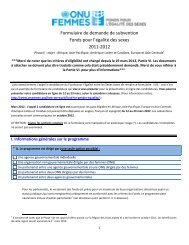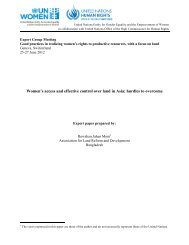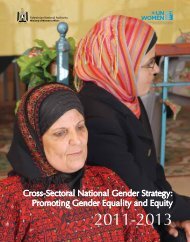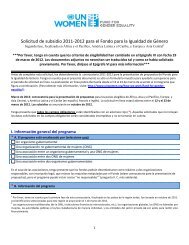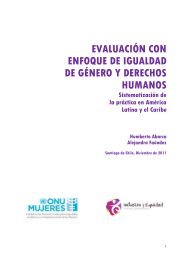- Page 1 and 2: informal justice systems charting a
- Page 3 and 4: informal justice systems charting a
- Page 5 and 6: List of abbreviations adr alternati
- Page 7 and 8: summary a. pLacing informaL Justice
- Page 9 and 10: state-linked or recognized along th
- Page 11 and 12: . framing informaL Justice systems
- Page 13 and 14: such as measures to tackle child ma
- Page 15 and 16: ijs could also enforce norms that a
- Page 17 and 18: face a choice between supporting in
- Page 19 and 20: oX 8. programming in custom-based J
- Page 21 and 22: oX 10. eXampLe of seLf-statement me
- Page 23 and 24: could attempt to engage with the cr
- Page 25 and 26: consideration. Programming can infl
- Page 27 and 28: Programming should look at the tota
- Page 29 and 30: introduction aims and approach unti
- Page 31 and 32: it may be better to conceive of thi
- Page 33 and 34: methodoLogy commissioned by unDP, u
- Page 35 and 36: given the many and ambiguous relati
- Page 37: the term ‘informal justice’ may
- Page 41 and 42: cuLturaL rights and the LinK to Que
- Page 43 and 44: who approaches the informal justice
- Page 45 and 46: the country studies show that the l
- Page 47 and 48: traditional authority structures fa
- Page 49 and 50: emergence of modern nation states.
- Page 51 and 52: models of common and civil law. 70
- Page 53 and 54: may differ slightly between countri
- Page 55 and 56: e good reasons why people prefer pr
- Page 57 and 58: the types of cases that traditional
- Page 59 and 60: there are few examples of religious
- Page 61 and 62: adjudicative function from its orig
- Page 63 and 64: for clear selection criteria and co
- Page 65 and 66: composition and appointment the tar
- Page 67 and 68: ‘limited integration’ refers to
- Page 69 and 70: some lc courts do not refer cases t
- Page 71 and 72: transformation of customary, indige
- Page 73 and 74: according to african rights (1996),
- Page 75 and 76: People typically sought outside adv
- Page 77 and 78: ineffectiveness: settlement of case
- Page 79 and 80: nevertheless, the data also appear
- Page 81 and 82: 2. informal Justice systems’ case
- Page 83 and 84: preferences and gender of users in
- Page 85 and 86: KnoWLedge and use of LaWs and LegaL
- Page 87 and 88: case outcomes Providers indicate th
- Page 89 and 90:
these functions or by legally recog
- Page 91 and 92:
substantive issues the core issue h
- Page 93 and 94:
the path that the court has chosen
- Page 95 and 96:
this area is difficult to regulate
- Page 97 and 98:
impLications for programming the pr
- Page 99 and 100:
violence against women (VaW) is a h
- Page 101 and 102:
the ceDaW reporting guidelines 174
- Page 103 and 104:
on procedures for appointment. acco
- Page 105 and 106:
law, without discrimination. 203 in
- Page 107 and 108:
While law reforms in 2006 removed t
- Page 109 and 110:
substantive rights: Women’s human
- Page 111 and 112:
the recognition of customary marria
- Page 113 and 114:
custody of chiLdren the ceDaW commi
- Page 115 and 116:
may be far from their own families
- Page 117 and 118:
the 1998 ugandan legislation was th
- Page 119 and 120:
again, a distinction must be made b
- Page 121 and 122:
surface and be reflected in customa
- Page 123 and 124:
four guiding principles from the co
- Page 125 and 126:
customary leaders to carry out adop
- Page 127 and 128:
enforcement of such rights is uncer
- Page 129 and 130:
consideration of the periodic repor
- Page 131 and 132:
informaL Justice systems, chiLd vic
- Page 133 and 134:
in cooperation with unicef, unoDc h
- Page 135 and 136:
the country studies in this study d
- Page 137 and 138:
programming With informaL Justice s
- Page 139 and 140:
many standards on structure and pro
- Page 141 and 142:
structures in which custom is embed
- Page 143 and 144:
incLusion of informaL Justice syste
- Page 145 and 146:
While the World Bank study in sierr
- Page 147 and 148:
the category of safety and security
- Page 149 and 150:
CaTegorieS Sub- CaTegorieS Structur
- Page 151 and 152:
programming and the LinK to typoLog
- Page 153 and 154:
the study cites schärf’s view th
- Page 155 and 156:
advantages of ‘justice as theatre
- Page 157 and 158:
aSSumpTionS of feaSibiliT y and imp
- Page 159 and 160:
aSSumpTionS of feaSibiliT y and imp
- Page 161 and 162:
aSSumpTionS of feaSibiliT y and imp
- Page 163 and 164:
constitutional level alone, without
- Page 165 and 166:
aims to document customs that promo
- Page 167 and 168:
7. conduct/supervise the ascertainm
- Page 169 and 170:
Where local elders choose tradition
- Page 171 and 172:
practices, 416 which makes some use
- Page 173 and 174:
accountabiLity mechanisms: transpar
- Page 175 and 176:
LinKages among primary Justice prov
- Page 177 and 178:
Linkages to Wider development progr
- Page 179 and 180:
carbone, g. m., 2003: Emerging Plur
- Page 181 and 182:
Kanyongolo, f. e., 2006: Malawi: Ju
- Page 183 and 184:
siddiqi, D./one World action, 2003:
- Page 185 and 186:
unesco.org/fileadmin/multimeDia/hQ/
- Page 187 and 188:
Vera institute of justice, 2003: Me
- Page 189 and 190:
Press release of 15 july 2010 regar
- Page 191 and 192:
land act, chapter 227, 1998 (uganda
- Page 193 and 194:
methodoLogy process ...............
- Page 195 and 196:
country studies the country studies
- Page 197 and 198:
seLection of geographicaL areas for
- Page 199 and 200:
there is a risk of a tendency to pl
- Page 201 and 202:
the quantitative research, which wa
- Page 203 and 204:
the operation of informaL Justice s
- Page 205 and 206:
viLLage courts and arbitration coun
- Page 207 and 208:
including in ijs. Public perception
- Page 209 and 210:
the ngo then appoints a paid mediat
- Page 211 and 212:
WHEN YOU HAVE A PROBLEM OR CASE, WH
- Page 213 and 214:
provider profiLes IF THERE IS A CON
- Page 215 and 216:
matters involving female disputants
- Page 217 and 218:
isk. in some places, schools had be
- Page 219 and 220:
and opportunity factors, fear of th
- Page 221 and 222:
ecommendations for future programmi
- Page 223 and 224:
country study - ecuador the study .
- Page 225 and 226:
are indigenous according to the un
- Page 227 and 228:
that the deputy is recognized by th
- Page 229 and 230:
society, without altering the princ
- Page 231 and 232:
in this regard, this provision of t
- Page 233 and 234:
epresentatives as well as the un in
- Page 235 and 236:
as concerns mediation, interviews w
- Page 237 and 238:
profiLes, incLuding gender and age
- Page 239 and 240:
for the settlement of a case, the p
- Page 241 and 242:
Placing in confinement 80 (in the c
- Page 243 and 244:
esources: Land and Water disputes,
- Page 245 and 246:
have equal opportunities to voice t
- Page 247 and 248:
WHO WOULD PRESENT THE CHILD’S INT
- Page 249 and 250:
programming government programmes P
- Page 251 and 252:
unifem works on Women’s access to
- Page 253 and 254:
anneX i - eXcerpt of the organic La
- Page 255 and 256:
art. 345. - DeclinaciÓn De comPete
- Page 257 and 258:
the mission also included meetings
- Page 259 and 260:
the roLe and functions of customary
- Page 261 and 262:
customary or isLamic LaW? in practi
- Page 263 and 264:
participation and gender the above-
- Page 265 and 266:
While some interviewees did mention
- Page 267 and 268:
majority of the people, and the cle
- Page 269 and 270:
of women bring gBV or VaW cases to
- Page 271 and 272:
constitutional provisions, could pr
- Page 273 and 274:
detain people. it is known for chie
- Page 275 and 276:
succession matters invoLving chiLdr
- Page 277 and 278:
LegisLation as mentioned above, att
- Page 279 and 280:
outreach instruments unsurprisingly
- Page 281 and 282:
country study - papua neW guinea me
- Page 283 and 284:
peace officers/ngo or church-sponso
- Page 285 and 286:
eminder. if the subject of the noti
- Page 287 and 288:
White Paper proposes a review of th
- Page 289 and 290:
preferences of users and profiLes o
- Page 291 and 292:
WHEN YOU HAVE A PROBLEM OR CASE, WH
- Page 293 and 294:
against these developments in the l
- Page 295 and 296:
communities. the capacity constrain
- Page 297 and 298:
chiLdren and informaL Justice syste
- Page 299 and 300:
the link between child rights and r
- Page 301 and 302:
ecommendations for future programmi
- Page 303 and 304:
country study - maLaWi methodoLogy
- Page 305 and 306:
Political deadlock prevented the ad
- Page 307 and 308:
carried out by the mediators is ava
- Page 309 and 310:
as cammack, Kanyongolo and o’neil
- Page 311 and 312:
normative basis the constitution re
- Page 313 and 314:
means of expectations of proper con
- Page 315 and 316:
chiefs against charging fees. a fur
- Page 317 and 318:
a parallel structure to magistrate
- Page 319 and 320:
evieW and supervision the commissio
- Page 321 and 322:
user preferences WHEN YOU HAVE A PR
- Page 323 and 324:
WHICH JUSTICE PROVIDER DO YOU PREFE
- Page 325 and 326:
issues reLated to marriage the mhrc
- Page 327 and 328:
age of marriage, chiLd marriages an
- Page 329 and 330:
forum in the community and the woma
- Page 331 and 332:
courts illustrate the necessity to
- Page 333 and 334:
a manual that was more specifically
- Page 335 and 336:
most usefully be integrated into st
- Page 337 and 338:
many of the harmful practices have
- Page 339 and 340:
justice, as reflected primarily in
- Page 341 and 342:
system that has developed due to lo
- Page 343 and 344:
LC III Court at Sub-County Level LC
- Page 345 and 346:
Police force, such as by initiating
- Page 347 and 348:
the ugandan prison system as in man
- Page 349 and 350:
unlike other regions of uganda, the
- Page 351 and 352:
jurisdiction in criminal cases invo
- Page 353 and 354:
one major weakness of the system is
- Page 355 and 356:
of cases. typically, women have les
- Page 357 and 358:
or in some cases ‘remanding’ th
- Page 359 and 360:
adjudication bodies such as the ins
- Page 361 and 362:
aised questions on the relationship
- Page 363 and 364:
the offender. 95 as a consequence,
- Page 365 and 366:
traditional justice approaches have
- Page 367 and 368:
dispute resoLution in northeast uga
- Page 369 and 370:
minor offences are usually dealt wi
- Page 371 and 372:
livelihoods, income generation for
- Page 373 and 374:
customary marriage the customary ma
- Page 375 and 376:
female children can inherit propert
- Page 377 and 378:
vioLence against Women the widespre
- Page 379 and 380:
defilement ‘with or without corpo
- Page 381 and 382:
however, much of a woman’s status
- Page 383 and 384:
the status of chiLdren in uganda Le
- Page 385 and 386:
act. 205 many of the offences that
- Page 387 and 388:
an educated girl in Karamojong soci
- Page 389 and 390:
their land to remain under customar
- Page 391 and 392:
clarification of the lc system’s
- Page 393 and 394:
there has been a tendency towards a
- Page 395 and 396:
elated to the discussion of increas
- Page 398:
united nations development programm



